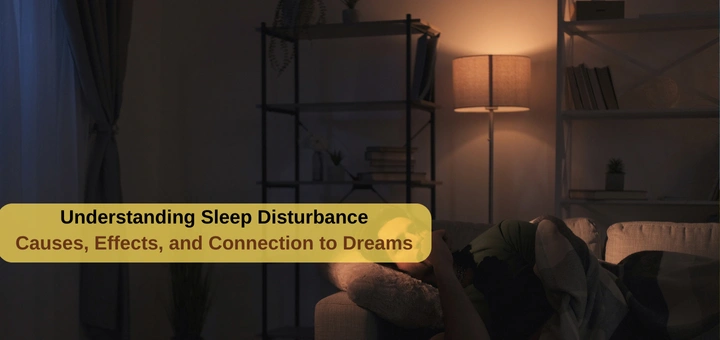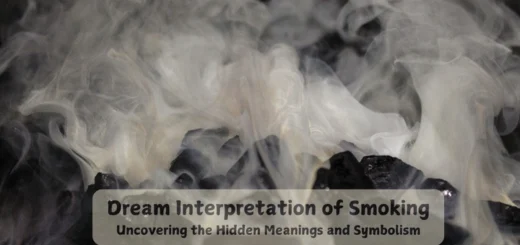Sleep Disturbance: Causes, Effects, and Connection to Dreams
Have you ever struggled with getting a good night’s sleep? Sleep disturbance is a common issue that affects millions of people worldwide, and its impact goes beyond just feeling tired. For those interested in dreams and their meanings, sleep disturbances can influence the types of dreams you experience and their clarity. Let’s explore the causes, effects, and solutions for sleep disturbances, all while examining how they connect to the fascinating world of dreams.

What Is Sleep Disturbance?
Sleep disturbance refers to disruptions in the natural sleep cycle, which can prevent a person from achieving restful and restorative sleep. These disruptions may manifest as difficulty falling asleep, waking up frequently during the night, or waking up too early. Sleep disturbances not only affect physical health but also influence the mind, often resulting in vivid or unsettling dreams.
Common Signs of Sleep Disturbance
- Difficulty falling asleep
- Frequent awakenings during the night
- Excessive daytime fatigue
- Vivid or disturbing dreams
- Difficulty concentrating or mood swings
How Sleep Disturbance Affects Your Dreams
Sleep disturbances can significantly alter the way you dream. The most vivid dreams occur during the REM (Rapid Eye Movement) stage of sleep, but interruptions can fragment this process. As a result, you may experience:
- Fragmented Dreams: Incomplete or confusing dream sequences.
- Recurring Nightmares: Stress-induced bad dreams that reflect unresolved fears or anxieties.
- Unusually Vivid Dreams: Heightened emotions and fatigue can amplify dream clarity and intensity.
For dream enthusiasts, sleep disturbance is a critical factor to address to ensure meaningful and interpretable dreams.
What Causes Sleep Disturbance?
Sleep disturbances can arise from various factors, including lifestyle, health, and environmental conditions. Here are some of the most common causes:
1. Stress and Anxiety
When your mind is racing with worries or stress, it can be difficult to fall asleep or stay asleep. Stress often triggers disturbing or vivid dreams as your subconscious processes unresolved emotions.
2. Poor Sleep Hygiene
Irregular sleep schedules, late-night screen time, or consuming caffeine before bed can disrupt your sleep cycle, leading to both physical fatigue and disjointed dreams.
3. Medical Conditions
Conditions like sleep apnea, restless leg syndrome, or chronic pain can cause frequent awakenings, preventing restorative sleep and contributing to dream disruption.
4. Medications
Certain medications, including antidepressants or stimulants, can affect your sleep cycle and intensify the content of your dreams.
5. Environmental Factors
Noise, light, or an uncomfortable sleeping environment can interrupt sleep and lead to vivid or unpleasant dreams.
How to Reduce Sleep Disturbance and Improve Dream Clarity
Improving your sleep quality is key to reducing disturbances and enhancing the quality of your dreams. Here are some tips:
1. Establish a Consistent Sleep Schedule
Go to bed and wake up at the same time every day, even on weekends. This helps regulate your body’s internal clock, promoting better sleep and healthier dreaming.
2. Create a Dream-Friendly Sleep Environment
Ensure your bedroom is quiet, dark, and cool. Consider using blackout curtains, earplugs, or a white noise machine to eliminate distractions.
3. Practice Relaxation Techniques
Incorporate practices like meditation, deep breathing, or progressive muscle relaxation to calm your mind before bed. These techniques can reduce stress and lead to more positive dream experiences.
4. Limit Screen Time
Avoid screens for at least an hour before bed. The blue light emitted by devices can suppress melatonin production, delaying sleep onset and disrupting your dreams.
5. Keep a Dream Journal
Documenting your dreams upon waking can help you understand recurring patterns and identify potential triggers for sleep disturbance. This is especially useful for interpreting dreams.
Sleep Disturbance and Lucid Dreaming
Interestingly, some sleep disturbances can increase the likelihood of lucid dreaming. Waking up frequently during REM sleep can make you more aware of your dream state. While this can be an exciting experience, chronic sleep disruption can still take a toll on your overall health. Balancing quality sleep with dream exploration is crucial for both your body and mind.
Frequently Asked Questions About Sleep Disturbance
Q: Can sleep disturbance cause nightmares?
A: Yes, sleep disturbance often triggers nightmares due to heightened stress and fragmented REM cycles.
Q: How does sleep disturbance impact mental health?
A: Prolonged sleep disturbance can lead to mood disorders, anxiety, and difficulty concentrating, all of which may affect your dream quality.
Q: Can sleep disturbance be a sign of a medical issue?
A: Yes, conditions like sleep apnea or chronic pain are common contributors to sleep disturbances. Consult a healthcare professional if issues persist.
Conclusion
Sleep disturbances not only affect your physical health but also impact the clarity and meaning of your dreams. By addressing the causes of disrupted sleep and practicing healthy habits, you can improve your overall sleep quality and deepen your connection to the dream world. For dream enthusiasts, understanding and mitigating sleep disturbances is key to unlocking the mysteries of your subconscious.

















